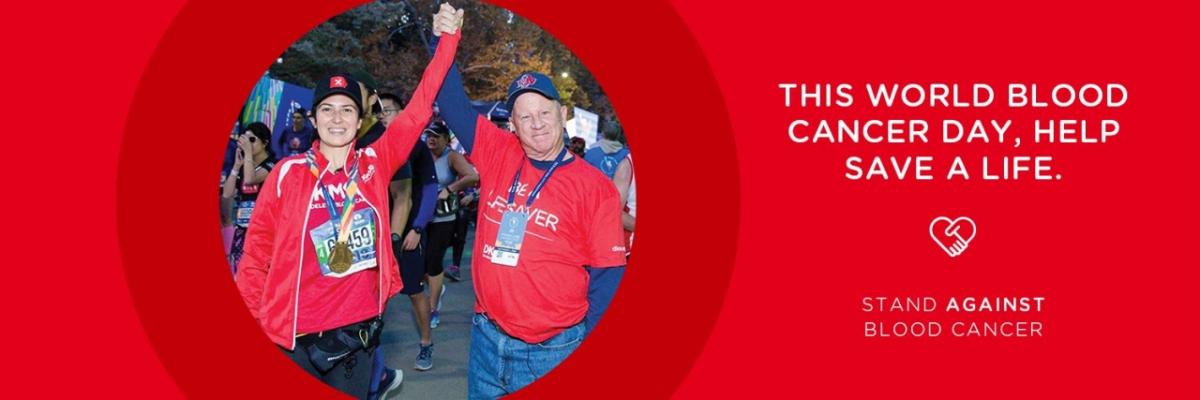DKMS Extends International Footprint With South African Partnership
DKMS AND THE SUNFLOWER FUND JOIN FORCES ON WORLD BLOOD CANCER DAY

NEW YORK, May 28, 2020 /3BL Media/– DKMS is pleased to announce a collaboration with The Sunflower Fund in South Africa to provide patients worldwide with a second chance at life.
The Sunflower Fund partnered by DKMS will begin operations in South Africa today, May 28,
2020. DKMS decided to announce the partnership on May 28th in honor of World Blood Cancer Day, a global awareness day to stand in solidarity with blood cancer patients around the world.
The Sunflower Fund partnered by DKMS aims to utilize local knowledge and a wealth of expertise to recruit stem cell donors and building an ethnically diverse registry of committed donors from across South Africa, Namibia, Ghana and Nigeria. The Sunflower Fund also maintains a patient support fund to assist patients who are unable to afford costs associated with getting a transplant.
Patients and donors of South African origin have unique HLA characteristics that are severely under-represented in the global database. Consequently, far too few patients find a matching donor and make it to transplant. “Every five minutes someone in South Africa is diagnosed with blood cancer or other life-threatening blood disorders such as sickle cell anemia. For many of these patients their only hope for a cure is a stem cell transplant from a matching donor,” says Dr. David Brittain, Clinical Hematologist, Albert Alberts Stem Cell Transplant Centre – Pretoria.
Only one third of patients find a matching donor within their family-- majority must rely on an unrelated donor, whose relevant tissue characteristics, also known as HLA-characteristics, match those of the patient as closely as possible. Unfortunately, less than 1% of the total population of South Africa are registered volunteer blood stem cell donors, which is significantly lower than many other countries, including the US.
“Facing the realities of genetic diversification and the subsequent role it will play in cancer treatments, global activities ensure the greatest chance of success for patients whose lives depend on finding a matching donor. Together we want to make a big impact in the lives of patients with blood disorders in South Africa and across the globe,” says Dr. Elke Neujahr, Global CEO DKMS.
“We are very excited about the partnership with DKMS. Growing the diversity of the donor pool is critically important and we see a fantastic opportunity to be able to do this together not only in South Africa but also in other African countries. We want to register as many potential donors to provide as many patients as possible with a second chance at life. This is our common mission,” says Alana James, CEO of the Sunflower Fund partnered by DKMS.
The Sunflower Fund and DKMS were both established on the grounds of personal stories – of families who committed to using their experience to champion the cause of stem cell donation to help other families.
The Sunflower Fund, in 1999, was created in honor of the heroic struggle against leukemia of two brave young men, Darren Serebro and Chris Corlett. While he was in treatment for acute lymphoblastic leukemia (ALL), Chris painted a picture, which he titled ‘Sunflowers of Hope’. This painting was the main inspiration for the name of The Sunflower Fund, by Chris’s mom, Tina Botha, the founder of the organization.
The DKMS story began when Mechtild Harf was told that the only treatment for her leukaemia was a bone marrow transplant and that she had no matching family members. At the time, there were only 3,000 potential stem cell donors on the German registry to provide a transplant. Her husband, Peter Harf, founded DKMS in 1991 and within one year, the registry counted 68,000 potential donors. Unfortunately, Mechtild did not survive, but before she passed away, she made Peter promise her that he would not stop fighting until every patient had a matching donor.
In different corners of the world, the fate of these families started a movement, a community of people committed to one cause: fighting blood cancer.
“Diseases do not respect borders, nor can our work be restricted by borders,” adds James.
With 10 million available donors and nearly 85,000 transplants facilitated, DKMS is the largest network of donor centers in the world. The impact of the organization is remarkable, with 40% of all unrelated blood stem cell transplants worldwide made possible by DKMS donors. This collaboration enables DKMS to contribute their experience in raising awareness of blood cancer and blood stem cell transplantation, of running an international registry and providing high quality blood stem cell products bringing hope to people all over the world.
Contact Info: press@dkms.org
About DKMS
DKMS is an international non-profit organization dedicated to the fight against blood cancer. Founded in 1991 in Germany by
Dr. Peter Harf, DKMS has expanded internationally by establishing entities in the US, Poland, the UK, Chile, together with BMST in India and in South Africa together with The Sunflower Fund partnered by DKMS. Together, they have registered more than 10 million potential blood stem cell donors and have given more than 84,000 patients across the globe a second chance at life by facilitating blood stem cell transplants.
About The Sunflower Fund
The Sunflower Fund is a donor recruitment center and stem cell registry for Africa and is part of a global network, dedicated to creating awareness about blood diseases and stem cell donation, recruiting blood stem cell donors and maintaining a registry of committed donors.
The Sunflower Fund pays for the cost of the tissue-type testing. This is fundamental to saving the lives of South Africans and patients globally who need a stem cell transplant. The chance of finding a matching donor is 1 in 100,000 – and as ethnic origin plays a significant role in the search for a donor, South Africa’s rainbow nation is at a distinct disadvantage, requiring a large pool of prospective donors.

